Harvard University on Overleaf
Overview
Harvard University is providing Overleaf Professional features for all students, faculty and staff who would like to use a collaborative, online LaTeX editor for their projects. Overleaf Professional features include real-time track changes, unlimited collaborators, and full document history.
Overleaf is designed to make the process of writing, editing and producing your research papers and project reports much quicker for both you and your collaborators. Overleaf can also be linked to other services such as reference managers to best fit into your workflow.
Harvard Library offers a guide to help you use Overleaf at https://guides.library.harvard.edu/overleaf.
If you're affiliated with the Harvard-Smithsonian Center for Astrophysics, there are additional, CfA-specific resources available to you at https://www.overleaf.com/edu/harvard-smithsonian-cfa.
Claim your Overleaf Professional upgrade by signing up (or signing in) below. You'll need to verify a Harvard University email address.
Join a community of over 8802 authors at Harvard University
Přihlásit se if you already have an Overleaf account.
or
Sign up if you don't have an Overleaf account yet.
Quick Start
Welcome to the quick start guide to Overleaf. We've put together some useful resources and links in the sections below, and if you have any questions about how to get started please let us know and we'll be happy to help!
For Students
Try out the Overleaf editor with built in tutorial
If you'd like to dive straight into the editor, simply click the button to create a new paper using our quick-start template. A short tutorial will walk you through the main features to quickly get you started.
Browse the Overleaf template gallery
You can find a selection of featured templates, or check out our full template gallery for more ideas and inspiration.
Take our free course to quickly master the LaTeX essentials
If you're new to LaTeX, we've put together a free online course to help you learn the basics. If you have never used LaTeX before, or if it has been a while and you would like a refresher, this is the place to start.
For Researchers
Find a journal template
Through our partnerships within the publishing community, we provide a selection of academic journal templates for articles and papers. These templates automatically format your manuscripts in the style required for submission to that journal.
Edit in Rich Text mode or directly in LaTeX
Overleaf provides an intuitive and easy-to-use manuscript editor (our rich text mode), which is especially useful if you or your co-authors aren't familiar with writing in LaTeX.
If you prefer to edit directly in LaTeX, you can! Overleaf provides a full collaborative online LaTeX editor you can switch to at any time.
Submitting your articles to journals, repositories and more
You can also submit your paper directly to a number of journals and other editorial and review services via the publish menu in the editor. Simply open the publish menu from any document and follow the appropriate 'Submit to ...' link.
For Teachers
Introducing Students to LaTeX
Overleaf has several on-demand webinars available that address a variety of beginner, intermediate, and advanced topics.
Help students understand LaTeX errors
Addressing errors as they happen helps ensure that your LaTeX project continues to compile and look the way it should.
Show your class how to turn on track changes for review
Overleaf offers an impressive collection of collaboration features, and your institutional subscription provides all users with access to the powerful track changes feature.
Intro Videos
Featured LaTeX Templates
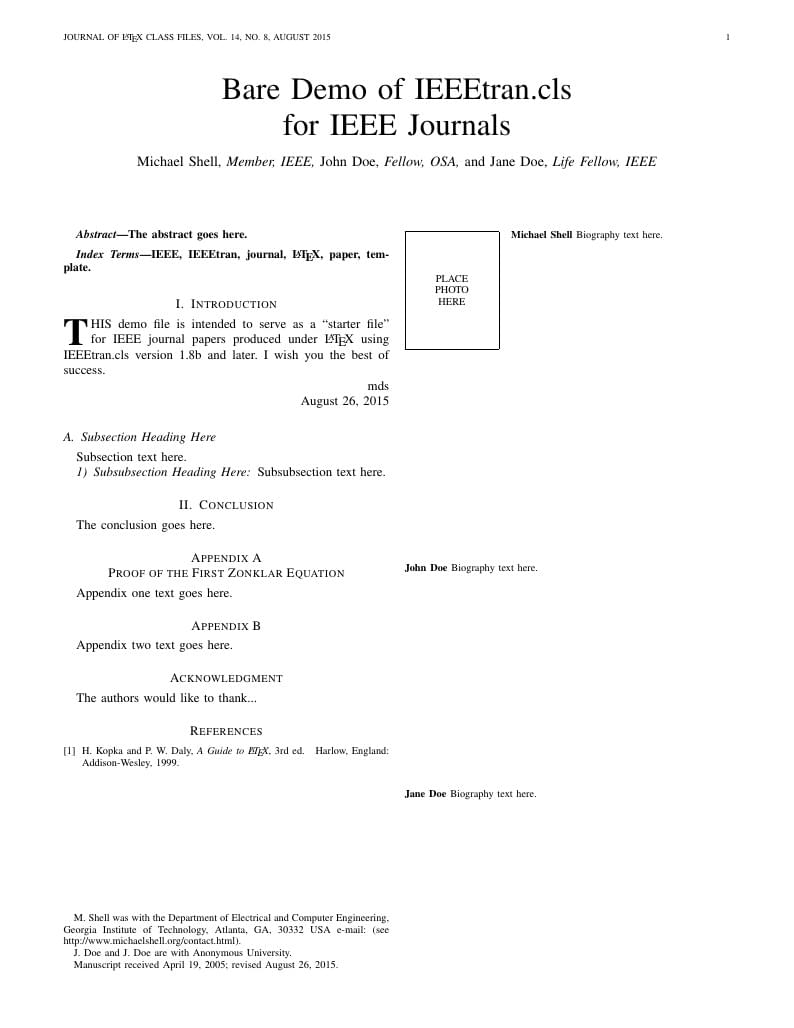
This is a skeleton file demonstrating the use of IEEEtran.cls with an IEEE journal paper. To start writing your manuscript in Overleaf, simply click the 'Open as template' button above. Additional IEEE templates are also available - please use the tags below to view. These include: additional article templates for specific journals (e.g. IEEE Photonics), templates for conference papers, and user-submitted examples and adaptations.
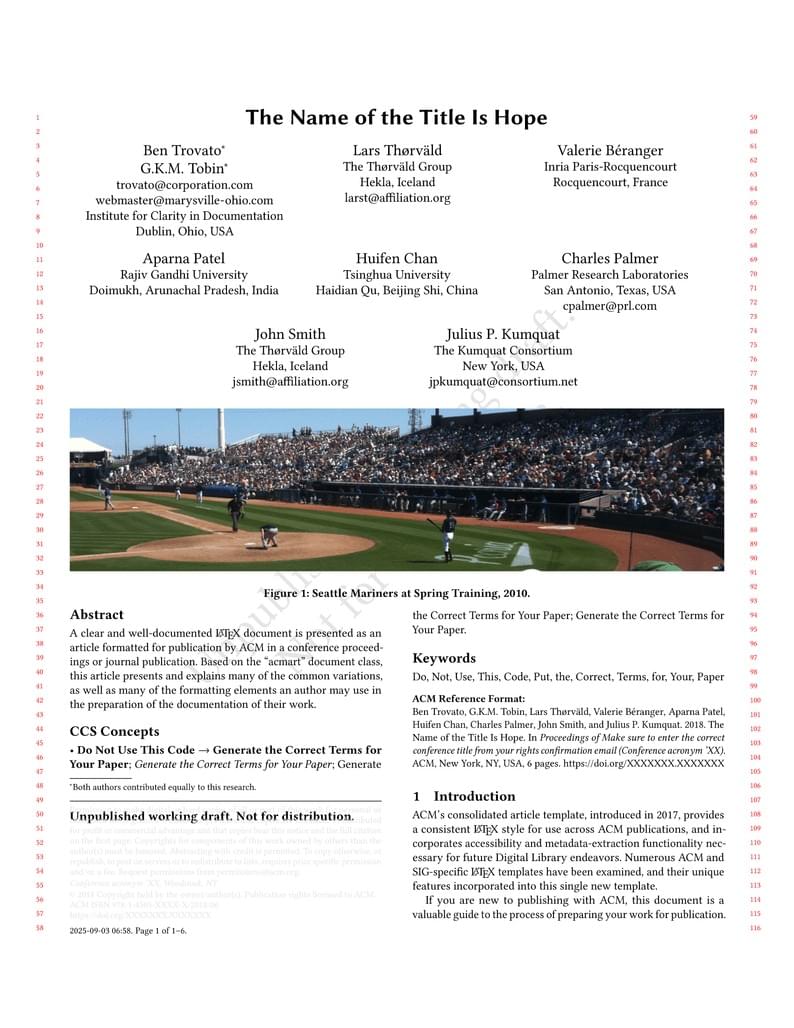
ACM has transitioned to a new authoring template. This new TeX template (acmart v2.16) consolidates the previous eight individual ACM journal and proceedings templates. The templates are updated to the latest software versions, developed to enable accessibility features, and they use a new font set. The new LaTeX package incorporates updated versions of the following ACM templates: ACM Journals: ACM Small, ACM Large, ACM and TOG (also for SIGGRAPH authors publishing in TOG) ACM proceedings templates: ACM Standard and SIGPLAN All journals use acmsmall with the following exceptions: acmlarge - Large single column format, used for IMWUT, JOCCH, PACMPL, POMACS, TAP, PACMHCI acmtog - Large double column format, used for TOG Note: Most proceedings authors will use the "sigconf" proceedings template. If you are unsure which template variant to use, please request clarification from your event or publication contact. Important information regarding submission versions for review: After finalizing the formatting of your paper you must use the option “manuscript” with \documentclass[manuscript]{acmart} command. This will generate the output in single column review format which is required. Accepted manuscripts will be transformed during production to produce properly formatted output accord to the publication specifications. Authors will be provided the opportunity to review and approve the formatted output before the article is published to the ACM Digital Library. Before using the 2017 ACM consolidated proceedings template, we strongly suggest that you read the TeX User Guide. Authors who plan to use their own packages should read the longer Implementation Guide.
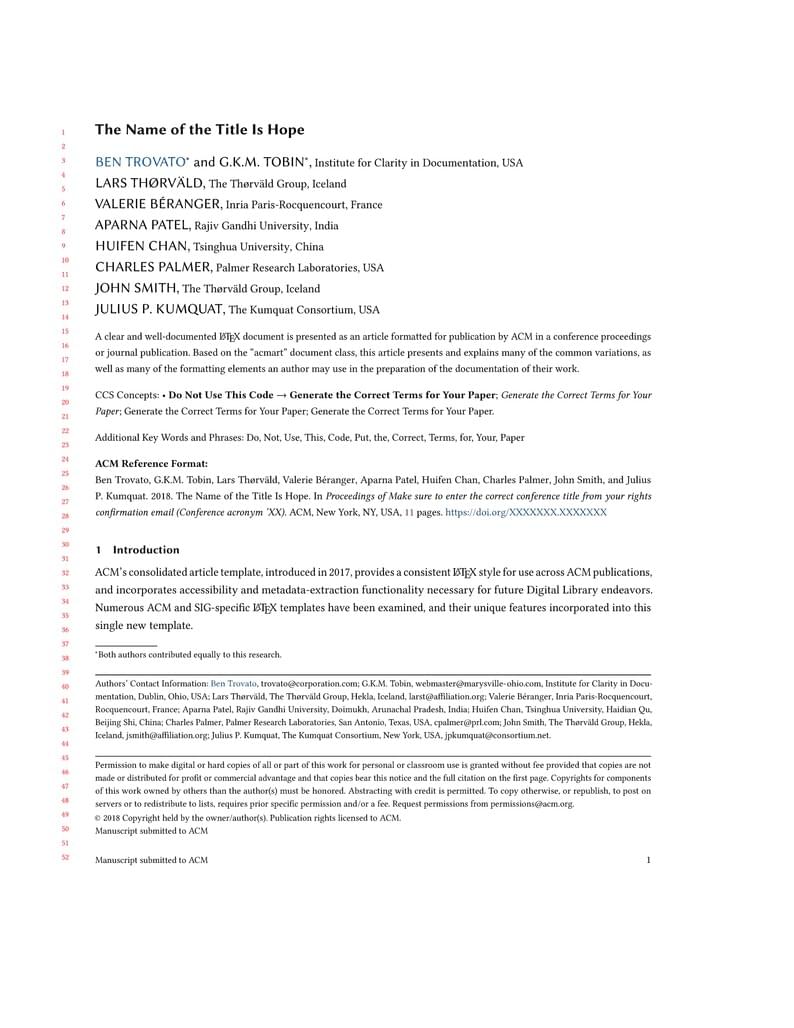
ACM has transitioned to a new authoring template. This new TeX template (acmart v2.16) consolidates the previous eight individual ACM journal and proceedings templates. The templates are updated to the latest software versions, developed to enable accessibility features, and they use a new font set. The new LaTeX package incorporates updated versions of the following ACM templates: ACM Journals: ACM Small, ACM Large, ACM and TOG (also for SIGGRAPH authors publishing in TOG) ACM proceedings templates: ACM Standard and SIGPLAN All journals use acmsmall with the following exceptions: acmlarge - Large single column format, used for IMWUT, JOCCH, PACMPL, POMACS, TAP, PACMHCI acmtog - Large double column format, used for TOG Note: Most proceedings authors will use the "sigconf" proceedings template. If you are unsure which template variant to use, please request clarification from your event or publication contact. Important information regarding submission versions for review: After finalizing the formatting of your paper you must use the option “manuscript” with \documentclass[manuscript]{acmart} command. This will generate the output in single column review format which is required. Accepted manuscripts will be transformed during production to produce properly formatted output accord to the publication specifications. Authors will be provided the opportunity to review and approve the formatted output before the article is published to the ACM Digital Library. Before using the 2017 ACM consolidated article template, we strongly suggest that you read the TeX User Guide. Authors who plan to use their own packages should read the longer Implementation Guide. More detailed Instructions for Authors are found at http://www.acm.org/publications/authors/information-for-authors. It is important to provide the proper indexing information from the ACM Computing Classification System (CCS). Accurate semantic tagging provides a reader with quick content reference; facilitates the DL search for related literature; enables several DL topic functions such as aggregated SIG and journal coverage areas; and helps ACM promote your work in other online resources. Once your article is complete, you can use the “Submit to ACM” button at the top of the Overleaf editor bar to quickly download your paper and go straight to the appropriate ACM submission site. For conference proceedings submissions, please refer to the submission guidelines in the relevant call-for-papers or on the event website. For support on using these templates, or on LaTeX in general, please contact the Overleaf team -- we're happy to help.
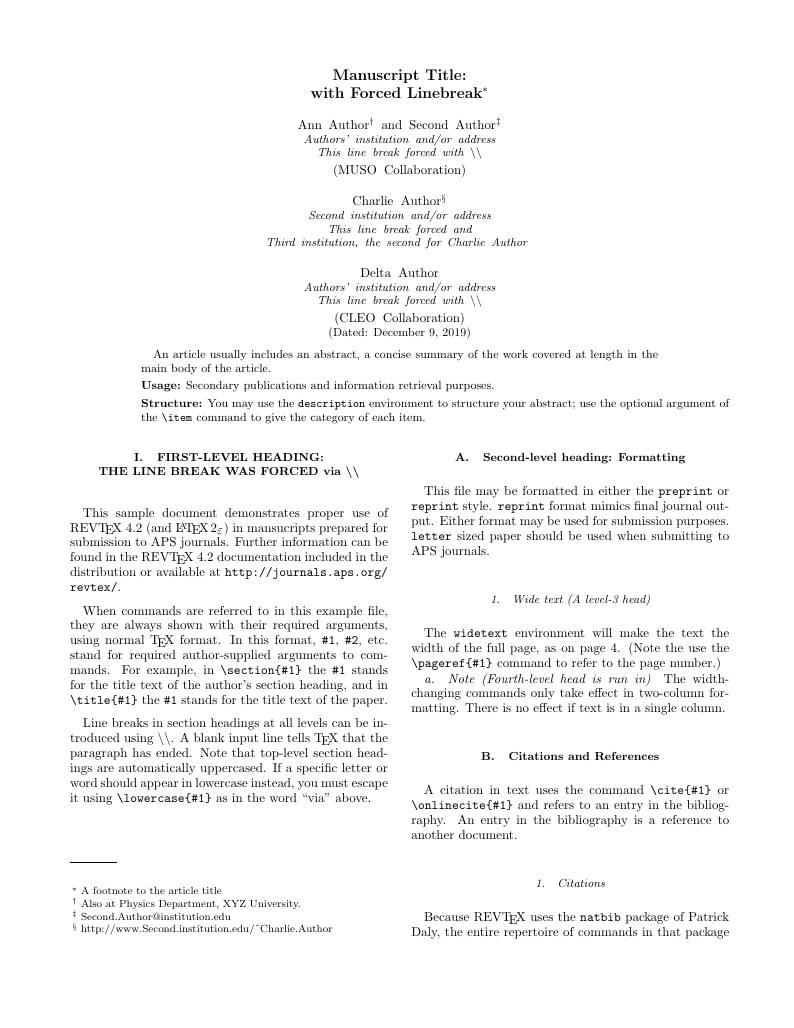
Template for American Physical Society (APS) and American Institute of Physics (AIP) journals, including Physical Review Letters, Physical Review A-E, Physical Review X, Reviews of Modern Physics, Applied Physics Letters, using the ReVTeX 4.2 document class.
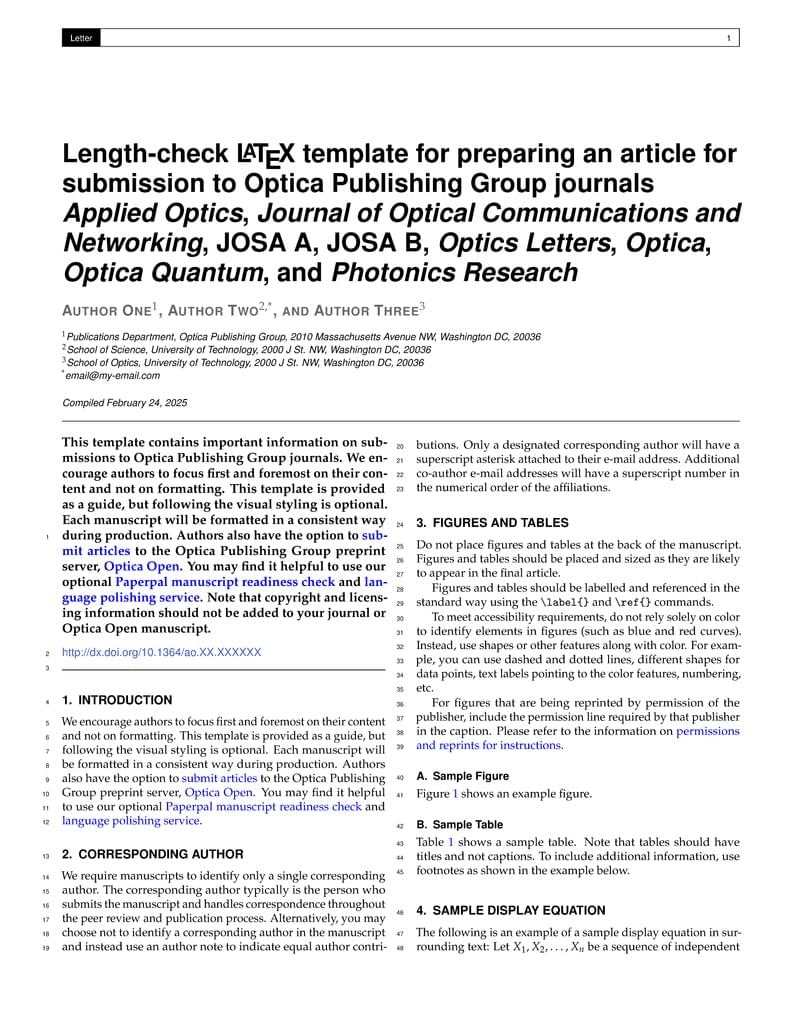
This template can be used to approximate final page count for submission to Optica Publishing Group’s journals Applied Optics, Journal of Optical Communications and Networking, JOSA A, JOSA B, Optics Letters, Optica, and Photonics Research. Use the shortarticle/true option for Optics Letters and short Optica articles. Note that this template can be run from your own TeX system or within the cloud-based Overleaf system. When compiling on your own TeX system, you may need to run bibtex fullrefs additionally to generate the full reference list for certain journal submission types. Once your article is complete, you may submit it directly to Prism (Optica's article tracking system) via the 'Submit to Optica' option in the Overleaf editor. opticajnl.cls v1.0, 2022/06/13: OSA renamed to Optica Publishing Group.
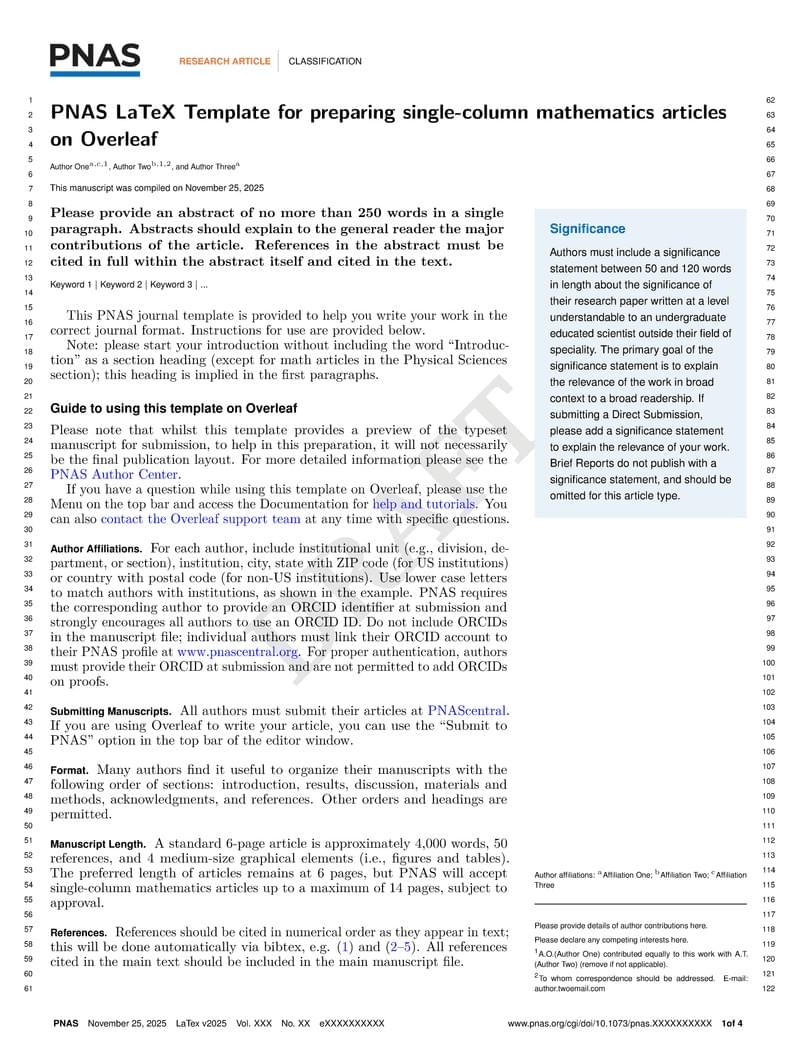
The NAS has created this template for authors submitting single-column mathematics articles to PNAS. The template allows authors to easily prepare and edit their manuscripts using Overleaf. Authors can then submit manuscripts to PNAS by using the PDF and source files generated by Overleaf. To begin writing online (in your browser), simply click the Open as Template button above. The Overleaf PNAS template will be loaded, and additional guidelines for preparing your mathematics submission are included within the template itself.
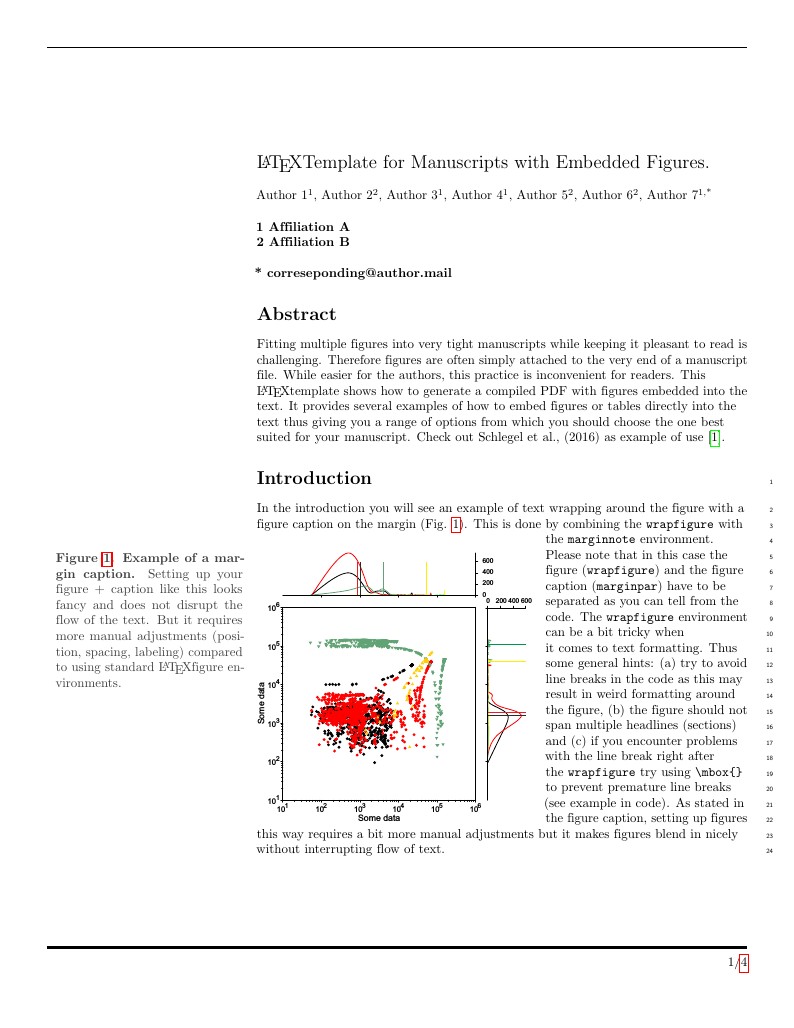
Template for writing scientific manuscripts. Features several examples of how to embed figures directly into the text. Use it to create compiled PDFs - e.g. for pre-peer review publication on the arXiv, bioRxiv, or to a repository such as figshare. To submit your manuscript to the arXiv, bioRxiv, figshare or one of many other destinations linked to from Overleaf, simply click the 'Journals & Services' button on the top bar of the Overleaf editor and choose the appropriate destination from the menu. You can also use the 'Download as zip - for submission' option in the Project menu to download a zip file containing all the required files for the submission (e.g. including the .bbl file if you've used a bibliography file for your references).
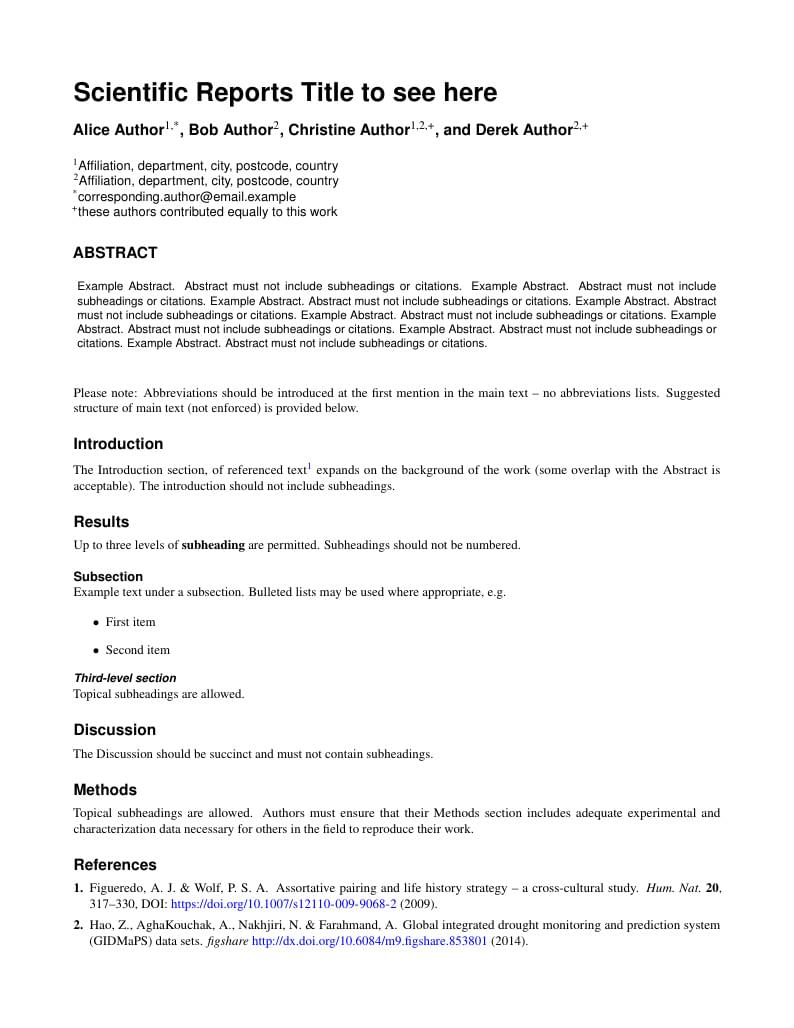
This is an article template for new submissions to Scientific Reports. Online and open access, Scientific Reports is a primary research publication from the publishers of Nature, covering all areas of the natural and clinical sciences. This template has been designed in collaboration with Overleaf to make it easier for you and your co-authors to write and submit your papers online. Scientific Reports is accepting submissions from all scientific fields. For more information, please see the information for authors section of their website.
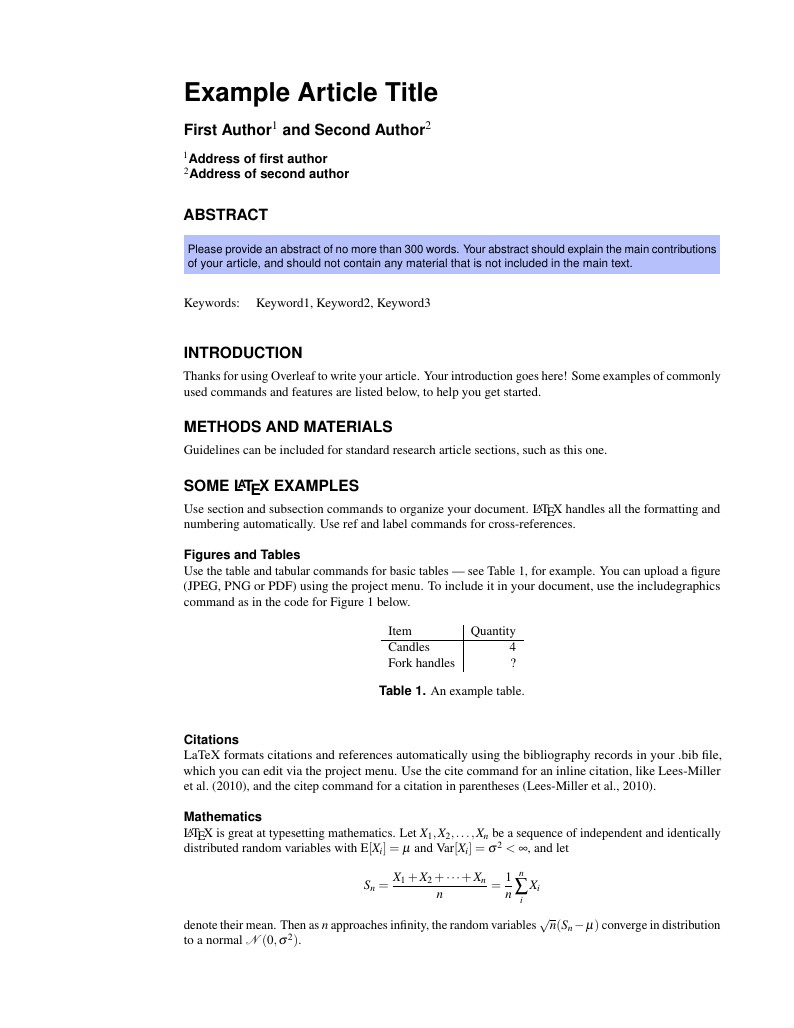
This is a basic journal article template which includes metadata fields for multiple authors, affiliations and keywords. It is also set up to use the lineno package for line numbers; these can be turned on by adding the 'lineno' option to the documentclass command.
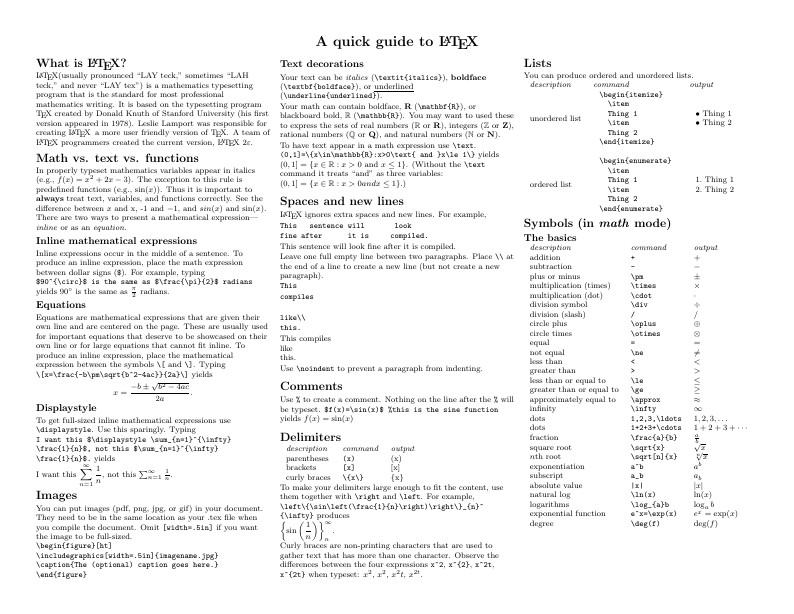
Know the LaTeX command you want to use but can't remember how to write it? Here we present a great tips sheet produced by Dave Richeson; it's pre-loaded in Overleaf so you can see how the commands work instantly. Simply click on the button above to open a version in Overleaf for editing (and to quickly copy and paste the commands you need!). For more comments visit this page on Dave's site, or if you'd like to work through a fuller introduction to LaTeX why not check out our free online course?
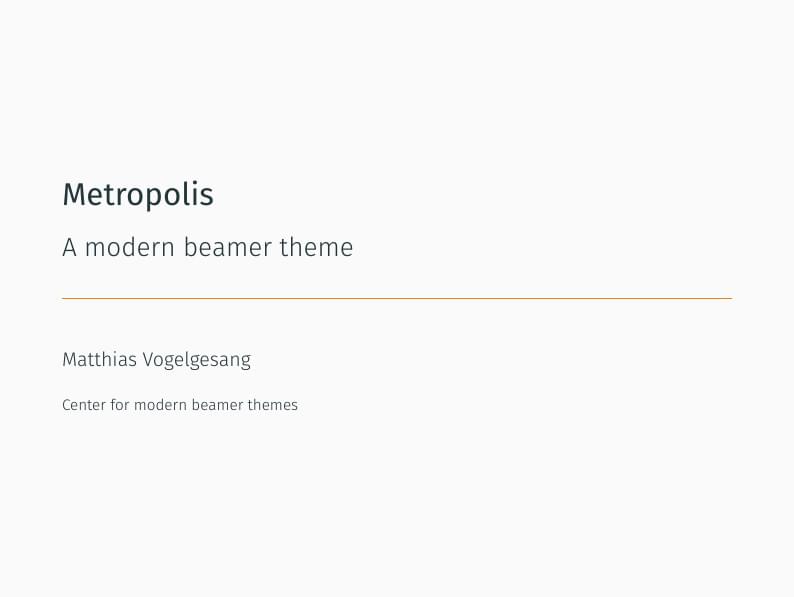
Metropolis is originally created by Matthias Vogelgesang and is available from https://github.com/matze/mtheme as well as CTAN. More information about the theme, including the design principles, can be found at http://bloerg.net/2014/09/20/a-modern-beamer-theme.html. This version demonstrates the use of a progress bar under the frame titles. See the manual for other customisation options.
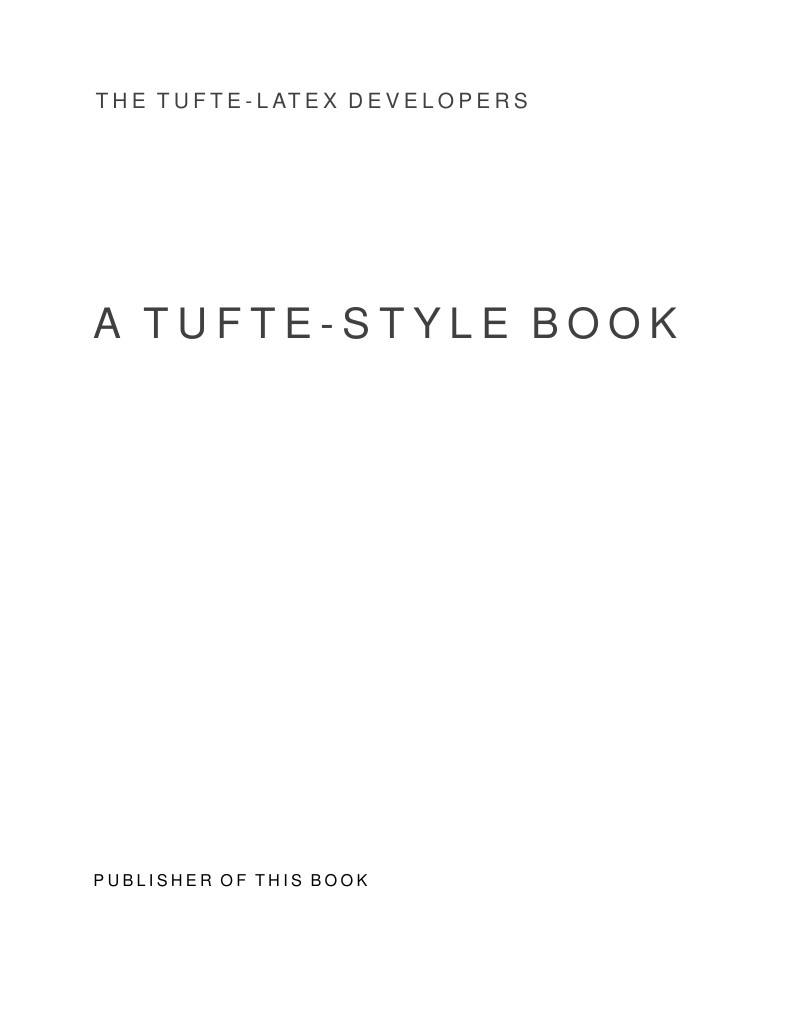
Edward Tufte is a pioneer in the field of data visualization, and his works inspired the creation of two LaTeX classes for books and handouts. Here we present the excellent sample book produced by the The Tufte-LaTeX Developers pre-loaded into Overleaf (formerly writeLaTeX) for you to use as a starting point for your own work. Simply click the button above to use Overleaf to create and edit your article - there's nothing to install and no sign up required. When you're finished, use our integrated publish to figshare option to publish your work freely online. Click here if you'd like to try the corresponding Tufte handout design on Overleaf. PS: If you're new to LaTeX, our free online LaTeX course covers all the steps you need to get you started.
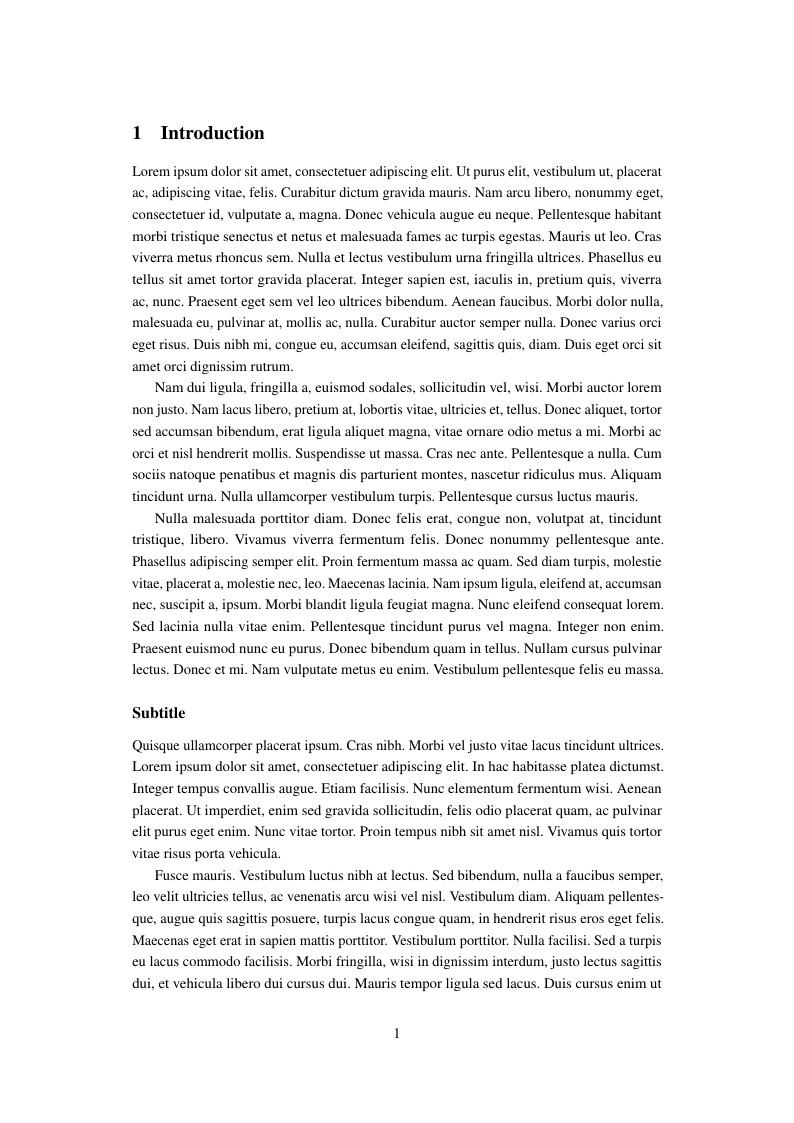
A4 document with page numbering and adjusted margins. Included options for gentium and times font, as well as language.
FAQ & Help
Who should I contact if I have questions about Overleaf or the Harvard license?
Please use our contact form and we'll make sure your question gets to the right person in our team.
I'm new to Overleaf, how should I get started?
We've put together a short How do I use Overleaf help page to give you pointers on exactly that :)
How do I upload an existing LaTeX project into Overleaf?
Here's an FAQ on how to import existing LaTeX documents into Overleaf.
What packages does Overleaf support?
Overleaf supports the packages listed here.
Are there guides available to help me use Overleaf?
Yes, Harvard Library offers a guide to help you use Overleaf at https://guides.library.harvard.edu/overleaf.